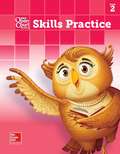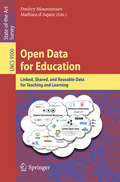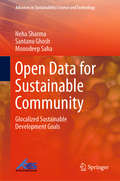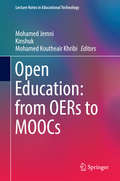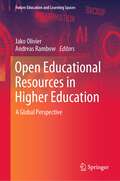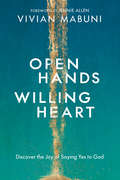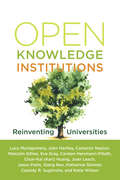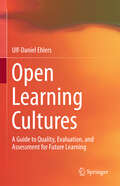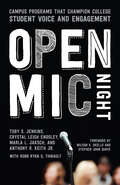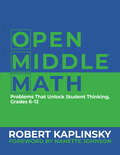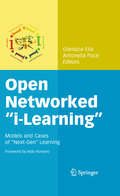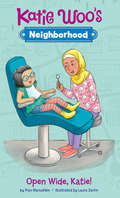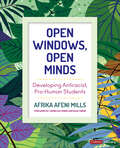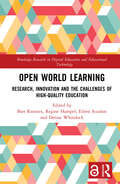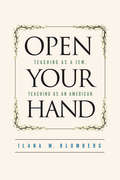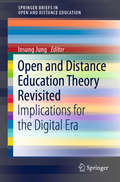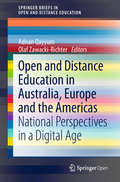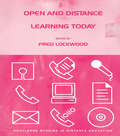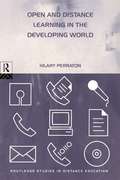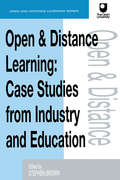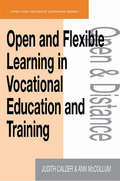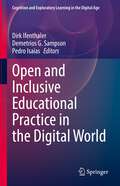- Table View
- List View
Open Court Reading Skills Practice Workbook, Book 2, Grade K (Imagine It)
by McGraw-Hill Education StaffOpen Court Reading Skills Practice Workbook, Book 2, Grade K
Open Data for Education
by Dmitry Mouromtsev Mathieu D'AquinThis volume comprises a collection of papers presented at an Open Data in Education Seminar and the LILE workshops during 2014-2015. In the first part of the book, two chapters give different perspectives on the current use of linked and open data in education, including the use of technology and the topics that are being covered. The second part of the book focuses on the specific, practical applications that are being put in place to exploit open and linked data in education today. The goal of this book is to provide a snapshot of current activities, and to share and disseminate the growing collective experience on open and linked data in education. This volume brings together research results, studies, and practical endeavors from initiatives spread across several countries around the world. These initiatives are laying the foundations of open and linked data in the education movement and leading the way through innovative applications.
Open Data for Sustainable Community: Glocalized Sustainable Development Goals (Advances in Sustainability Science and Technology)
by Neha Sharma Santanu Ghosh Monodeep SahaThis book is an attempt to bring value to the enterprise pursuits in the areas of research and innovation around the specific issues in terms of topic selection, open data resources and researcher orientation. Over the last 300 years, industrial revolutions have had game-changing impact on societies. Presently, by and large, we are at the crossroads of the fourth industrial revolution, where phygital systems are going to play a massive role, where digital systems can simulate and go beyond the limitations of the physical world, thereby enabling a new world order. This transformation is cutting across every sphere known to mankind. The world will become a globally localized marketplace. In today’s business world, sustainability is a corporate agenda. Enterprises are also aiming to be purpose-driven, adaptive and resilient to disruptions. The contributions to community and environment are part of their corporate branding. The book explores and presents a part of the open data sets from government institutions to achieve the sustainable goals at local level, in turn contributing towards global mission. As the topic suggests, the authors are looking at some of the specific issues in the areas of environment, agriculture and health care through the lens of data science. The authors believe that the above three areas chosen have deep relevance in today’s world. The intent is to explore these issues from a data and analytics perspective and identify cracks through which deeper inroads can be made. Conscious efforts have been taken to make use of all the major data science techniques like prediction, classification, clustering, and correlation. Given the above background, deeper waters will be explored through the contents of this book.
Open Education: from OERs to MOOCs
by Kinshuk Mohamed Jemni Mohamed Koutheair KhribiThis book focuses on the emerging phenomenon of Massive Open Online Courses (MOOCs), which are changing the fundamental underpinning of educational systems worldwide and forcing educators and other stakeholders to re-think the way instruction is currently conducted. It examines the origins of MOOCs within the context of the open education movement, and reviews current policies, guidelines and initiatives to promote the use of ICT in education through the development and use of open educational resources from international practices, including implementation and licensing issues. With a particular focus on new trends in MOOCs, the book explores the potential of this emerging paradigm, its rise and its impact on openness in education. Various new initiatives are also presented, including more global examples and those that are more geared to certain regional contexts. The book is intended as a stepping stone for both researchers and practitioners who are looking to approach MOOCs from a holistic perspective.
Open Educational Resources in Higher Education: A Global Perspective (Future Education and Learning Spaces)
by Jako Olivier Andreas RambowThis book explores open educational resources and open education through research conducted on this topic globally. This book engages with intersections between open educational resources, social justice and equality, as well as policy in terms of open educational resources. Numerous examples of open praxis are also included, ranging from open educational resources courses to the affordances of artificial intelligence, data-driven learning, and open textbooks in this context. Furthermore, chapters range from providing a broad overview of open educational resources international and regional initiatives in Africa, to cases of work done in the United States, New Zealand, Israel, and Hong Kong. The role of Wikipedia and Wikidata is also prominent. Finally, this book includes unique contributions, focusing on open educational resources and feminist pedagogy, as well as disabled learners’ motivations for participating in Massive Open Online Courses (MOOCs). Academics and researchers working in the field of open education and higher education in general will understand the importance of this work.
Open Hands, Willing Heart: Discover the Joy of Saying Yes to God
by Vivian MabuniFrom a veteran Cru staff member, Bible teacher, and popular speaker comes an invitation for Christian women to discover how yielding ourselves wholly to God, especially in the midst of challenging circumstances, lends new purpose to our lives.We know that the center of God's will is the best place to be, but surrender is easier said than done. A host of hurdles, from busyness and bitterness to complacency and control, can prevent us from moving where He directs. In this challenging yet warmhearted book, Vivian Mabuni provides an authentic look at what it means to willingly risk saying yes to whatever God asks--and highlights a practical path to the deeper joy of a yielded life.
Open Knowledge Institutions: Reinventing Universities
by John Hartley Lucy Montgomery Carmeron Neylon Malcolm Gillies Eve GrayThe future of the university as an open knowledge institution that institutionalizes diversity and contributes to a common resource of knowledge: a manifesto.In this book, a diverse group of authors—including open access pioneers, science communicators, scholars, researchers, and university administrators—offer a bold proposition: universities should become open knowledge institutions, acting with principles of openness at their center and working across boundaries and with broad communities to generate shared knowledge resources for the benefit of humanity. Calling on universities to adopt transparent protocols for the creation, use, and governance of these resources, the authors draw on cutting-edge theoretical work, offer real-world case studies, and outline ways to assess universities&’ attempts to achieve openness. Digital technologies have already brought about dramatic changes in knowledge format and accessibility. The book describes further shifts that open knowledge institutions must make as they move away from closed processes for verifying expert knowledge and toward careful, mediated approaches to sharing it with wider publics. It examines these changes in terms of diversity, coordination, and communication; discusses policy principles that lay out paths for universities to become fully fledged open knowledge institutions; and suggests ways that openness can be introduced into existing rankings and metrics. Case studies—including Wikipedia, the Library Publishing Coalition, Creative Commons, and Open and Library Access—illustrate key processes.
Open Learning Cultures
by Ulf-Daniel EhlersToday we are seeing a new form of blended learning: not only is technology enhancing the learning environment but formal and informal learning are combining and there is self- and peer-assessment of results. Open learning cultures are challenging the old and long-practiced methods used by educators and transforming learning into a more student-driven and independent activity , which uses online tools such as blogs, wikis or podcasts to connect resources, students and teachers in a novel way. While in higher education institutions most assessments are still tied to formal learning scenarios, teachers are more and more bound to recognize their students' informal learning processes and networks. This book will help teachers, lecturers and students to better understand how open learning landscapes work, how to define quality and create assessments in such environments, and how to apply these new measures. To this end, Ehlers first elaborates the technological background for more collaborative, distributed, informal, and self-guided learning. He covers the rise of social media for learning and shows how an architecture of participation can change learning activities. These new paradigms are then applied to learning and education to outline what open learning landscapes look like. Here he highlights the shift from knowledge transfer to competence development, the increase in lifelong learning, and the importance of informal learning, user generated content, and open educational resources. He then shows how to manage quality by presenting a step by step guide to developing customized quality concepts for open learning landscapes. Finally, several methods dealing with assessment in these new environments are presented, including guidelines, templates and use cases to exemplify the approaches. Overall, Ehlers argues for assessment as an integral part of learning processes, with quality assurance as a method of stimulating a quality culture and continuous quality development rather than as a simple controlling exercise.
Open Mic Night: Campus Programs That Champion College Student Voice and Engagement
by Toby S. Jenkins Crystal Leigh Endsley Marla L. Jaksch Anthony R. KeithWINNER OF 2018 AERA DIVISION B OUTSTANDING BOOK AWARD FOR OUTSTANDING EDITED COLLECTION IN CURRICULUM STUDIESWhile campuses across the United States have been offering spoken word programs for over 20 years, little attention has been paid to their purpose and impact beyond their contribution to the campus social aesthetic. There is an increasing understanding that performance poetry and spoken word is much more than entertainment. Within disciplines such as English, Ethnic, Women’s, and Cultural Studies, scholarship has identified spoken word’s role in developing political agency among young adults; its utility for promoting authentic youth voice; and its importance as a tool of cultural engagement.This book – compiled by scholar artists, including internationally recognized spoken word performers – offers guidance to student affairs professionals on using spoken word as a tool for college student engagement, activism, and civic awareness. It makes the case that campus event spaces need to transcend their association with the theatre or art departments to provide a venue where students are allowed to be different and find opportunities for personal and intellectual development and civic engagement. Open mic nights offer college students a way to speak out, advocate, lead, educate, and explore with their peers. This book presents a mix of critical essays and college student writing that explore themes of spoken word, student engagement, and campus inclusion and address these key topics:• Spoken word as an educational, civic engagement, and personal development tool (particularly among traditionally marginalized communities)• The links between spoken word and social activism (art as social action; art as a form of civic leadership)• The importance of privileging student voice in student affairs programming (even when they yell; even when they’re angry)• The challenges that come with engaging students in exploring intersecting concepts like race, gender, and class• Considerations for creative and intentional spoken word programming (What does a creative program look like?) • Scaling up for sustainability (through student affairs/academic affairs partnerships, study abroad collaborations, etc.).
Open Middle Math: Problems That Unlock Student Thinking, 6-12
by Robert KaplinskyThis book is an amazing resource for teachers who are struggling to help students develop both procedural fluency and conceptual understanding.. --Dr. Margaret (Peg) Smith, co-author of5 Practices for Orchestrating Productive Mathematical Discussions Robert Kaplinsky, the co-creator of Open Middle math problems, brings hisnew class of tasks designed to stimulate deeper thinking and lively discussion among middle and high school students in Open Middle Math: Problems That Unlock Student Thinking, Grades 6-12. The problems are characterized by a closed beginning,- meaning all students start with the same initial problem, and a closed end,- meaning there is only one correct or optimal answer. The key is that the middle is open- in the sense that there are multiple ways to approach and ultimately solve the problem. These tasks have proven enormously popular with teachers looking to assess and deepen student understanding, build student stamina, and energize their classrooms. Professional Learning Resource for Teachers: Open Middle Math is an indispensable resource for educators interested in teaching student-centered mathematics in middle and high schools consistent with the national and state standards. Sample Problems at Each Grade: The book demonstrates the Open Middle concept with sample problems ranging from dividing fractions at 6th grade to algebra, trigonometry, and calculus. Teaching Tips for Student-Centered Math Classrooms: Kaplinsky shares guidance on choosing problems, designing your own math problems, and teaching for multiple purposes, including formative assessment, identifying misconceptions, procedural fluency, and conceptual understanding. Adaptable and Accessible Math: The tasks can be solved using various strategies at different levels of sophistication, which means all students can access the problems and participate in the conversation. Open Middle Math will help math teachers transform the 6th -12th grade classroom into an environment focused on problem solving, student dialogue, and critical thinking.
Open Middle Math: Problems That Unlock Student Thinking, 6-12
by Robert KaplinskyThis book is an amazing resource for teachers who are struggling to help students develop both procedural fluency and conceptual understanding.. --Dr. Margaret (Peg) Smith, co-author of5 Practices for Orchestrating Productive Mathematical Discussions Robert Kaplinsky, the co-creator of Open Middle math problems, brings hisnew class of tasks designed to stimulate deeper thinking and lively discussion among middle and high school students in Open Middle Math: Problems That Unlock Student Thinking, Grades 6-12. The problems are characterized by a closed beginning,- meaning all students start with the same initial problem, and a closed end,- meaning there is only one correct or optimal answer. The key is that the middle is open- in the sense that there are multiple ways to approach and ultimately solve the problem. These tasks have proven enormously popular with teachers looking to assess and deepen student understanding, build student stamina, and energize their classrooms. Professional Learning Resource for Teachers: Open Middle Math is an indispensable resource for educators interested in teaching student-centered mathematics in middle and high schools consistent with the national and state standards. Sample Problems at Each Grade: The book demonstrates the Open Middle concept with sample problems ranging from dividing fractions at 6th grade to algebra, trigonometry, and calculus. Teaching Tips for Student-Centered Math Classrooms: Kaplinsky shares guidance on choosing problems, designing your own math problems, and teaching for multiple purposes, including formative assessment, identifying misconceptions, procedural fluency, and conceptual understanding. Adaptable and Accessible Math: The tasks can be solved using various strategies at different levels of sophistication, which means all students can access the problems and participate in the conversation. Open Middle Math will help math teachers transform the 6th -12th grade classroom into an environment focused on problem solving, student dialogue, and critical thinking.
Open Networked "i-Learning"
by Antonella Poce Gianluca EliaOpen Source Applications Springer Book Series Editor: Ernesto Damiani, University of Milan, Italy http://sesar.dti.unimi.it/ossbook/ A new overall interdisciplinary framework called "i learning" integrates managerial organization and technology aspects also known as "technology enhanced learning". Open Networked "i Learning": Models and Cases of "Next-Gen" Learning begins its investigation with the important changes that have recently occurred within the management, technology and society fields. Social and cultural aspects of society that influence the "dynamics" and the "styles" of the learning processes are presented as well. The last section of this edited volume focuses on possible future scenarios of the learning processes by describing the main models, processes, tools, technologies, and involved organizations. Open Networked "i Learning": Models and Cases of "Next-Gen" Learning is suitable for advanced under- and graduate level students and professors concentrating on computer science, engineering and business management as a secondary text or reference book. Professionals and researchers who work in the related industry of technology enhanced learning will find this book useful as well.
Open Wide, Katie! (Katie Woo's Neighborhood)
by Fran ManushkinAfter a trip to the zoo Katie wonders how animals clean their teeth. She asks her dental hygienist at her dental appointment.The hygienist, Ms. Malek, can't answer all of Katie's curious questions. But she still makes Katie's trip to the dentist comfortable and fun. Katie loves her community and that love is shown in Katie Woo's Neighborhood, an early chapter book series by author Fran Manushkin.
Open Windows, Open Minds: Developing Antiracist, Pro-Human Students (Corwin Literacy)
by Afrika Afeni Mills"Afrika Afeni Mills’ book fills an important gap in the arena of diversity, equity and inclusion. Most books are focused on the needs of children of color, but she helps us understand why White students need to build their cultural competence if we are to truly have a society that is bias-free. If you’re a White educator or parent, this book will help you to let go of the things that no longer serve you, and to teach your students to embrace those things that will help create welcoming environments where all feel a sense of belonging." —Zaretta Hammond Culturally Responsive Teaching and the Brain: Promoting Authentic Engagement and Rigor Equip your students—and yourself—to grapple with racial identity and crucial questions about race. As antiracist educators, we strive to create learning environments where White-identifying students learn to shift from centering their own racial identity to recognizing the histories, perspectives, and experiences of others. How do we make that vision a reality? In Open Windows, Open Minds, transformational educator Afrika Afeni Mills explores why racial identity work is crucial, especially for White-identifying students and teachers, and shows educators how to use literacy instruction to provide more windows to racial awareness, antiracist thinking, and pro-human action in the classroom. This roadmap for moving from intention to action includes: Exercises that push educators to examine their own racial identity before facilitating antiracism work with students Prompts that lead educators from deep thinking to instructional planning and implementation Developmentally appropriate teaching strategies for guiding students toward understanding racial identity and engaging in action-oriented learning Tools and resources for navigating challenges, finding allies, and creating partnerships Engaging in anti-bias, antiracist work requires actively thinking, doing, and evolving. Open windows to racial identity and awareness in your students and help create a more inclusive and equitable society.
Open Windows, Open Minds: Developing Antiracist, Pro-Human Students (Corwin Literacy)
by Afrika Afeni Mills"Afrika Afeni Mills’ book fills an important gap in the arena of diversity, equity and inclusion. Most books are focused on the needs of children of color, but she helps us understand why White students need to build their cultural competence if we are to truly have a society that is bias-free. If you’re a White educator or parent, this book will help you to let go of the things that no longer serve you, and to teach your students to embrace those things that will help create welcoming environments where all feel a sense of belonging." —Zaretta Hammond Culturally Responsive Teaching and the Brain: Promoting Authentic Engagement and Rigor Equip your students—and yourself—to grapple with racial identity and crucial questions about race. As antiracist educators, we strive to create learning environments where White-identifying students learn to shift from centering their own racial identity to recognizing the histories, perspectives, and experiences of others. How do we make that vision a reality? In Open Windows, Open Minds, transformational educator Afrika Afeni Mills explores why racial identity work is crucial, especially for White-identifying students and teachers, and shows educators how to use literacy instruction to provide more windows to racial awareness, antiracist thinking, and pro-human action in the classroom. This roadmap for moving from intention to action includes: Exercises that push educators to examine their own racial identity before facilitating antiracism work with students Prompts that lead educators from deep thinking to instructional planning and implementation Developmentally appropriate teaching strategies for guiding students toward understanding racial identity and engaging in action-oriented learning Tools and resources for navigating challenges, finding allies, and creating partnerships Engaging in anti-bias, antiracist work requires actively thinking, doing, and evolving. Open windows to racial identity and awareness in your students and help create a more inclusive and equitable society.
Open World Learning: Research, Innovation and the Challenges of High-Quality Education (Routledge Research in Digital Education and Educational Technology)
by Regine Hampel Eileen Scanlon Bart Rienties Denise WhitelockThis book provides state-of-the-art contemporary research insights into key applications and processes in open world learning. Open world learning seeks to understand access to education, structures, and the presence of dialogue and support systems. It explores how the application of open world and educational technologies can be used to create opportunities for open and high-quality education. Presenting ground-breaking research from an award winning Leverhulme doctoral training programme, the book provides several integrated and cohesive perspectives of the affordances and limitations of open world learning. The chapters feature a wide range of open world learning topics, ranging from theoretical and methodological discussions to empirical demonstrations of how open world learning can be effectively implemented, evaluated, and used to inform theory and practice. The book brings together a range of innovative uses of technology and practice in open world learning from 387,134 learners and educators learning and working in 136 unique learning contexts across the globe and considers the enablers and disablers of openness in learning, ethical and privacy implications, and how open world learning can be used to foster inclusive approaches to learning across educational sectors, disciplines and countries. The book is unique in exploring the complex, contradictory and multi-disciplinary nature of open world learning at an international level and will be of great interest to academics, researchers, professionals, and policy makers in the field of education technology, e-learning and digital education.
Open Your Hand: Teaching as a Jew, Teaching as an American
by Ilana BlumbergFifteen years into a successful career as a college professor, Ilana Blumberg encounters a crisis in the classroom that sends her back to the most basic questions about education and prompts a life-changing journey that ultimately takes her from East Lansing to Tel Aviv. As she explores how civic and religious commitments shape the culture of her humanities classrooms, Blumberg argues that there is no education without ethics. When we know what sort of society we seek to build, our teaching practices follow. In vivid classroom scenes from kindergarten through middle school to the university level, Blumberg conveys the drama of intellectual discovery as she offers novice and experienced teachers a pedagogy of writing, speaking, reading, and thinking that she links clearly to the moral and personal development of her students. Writing as an observant Jew and as an American, Blumberg does not shy away from the difficult challenge of balancing identities in the twenty-first century: how to remain true to a community of origin while being a national and global citizen. As she negotiates questions of faith and citizenship in the wide range of classrooms she traverses, Blumberg reminds us that teaching - and learning - are nothing short of a moral art, and that the future of our society depends on it.
Open and Distance Education Theory Revisited: Implications for the Digital Era (SpringerBriefs in Education)
by Insung JungThis book explores foundational theories that have been applied in open and distance education (ODE) research and refined to reflect advances in research and practice. In addition, it develops new theories emerging from recent developments in ODE. The book provides a unique and up-to-date source of information for ODE scholars and graduate students, enabling them to make sense of essential theory, research and practice in their field, and to comprehend the gaps in, and need for further enquiry into, theoretical approaches in the digital era. It also offers theory-based advice and guidelines for practitioners, helping them make and justify decisions and actions concerning the development, implementation, research and evaluation of ODE.
Open and Distance Education in Australia, Europe and the Americas: National Perspectives in a Digital Age (SpringerBriefs in Education)
by Olaf Zawacki-Richter Adnan QayyumThis book is open access under a CC BY 4.0 license.This book describes the history, structure and institutions of open and distance education in six countries: Australia, Brazil, Canada, Germany, the UK and the US. It discusses how open and distance education is evolving in a digital age to reflect the needs and circumstances of national higher education systems in these countries, and explores the similarities and differences between the ways in which they are organized and structured. It is the first book to make such comparisons and draw conclusions about the nature of open and distance education in the context of various national higher education systems. In a digital era with growing use of online education as well as open and distance education, this book is particularly useful for policy-makers and senior administrators who want to learn about organizing and expanding open and distance education provision. It is also a valuable reference for researchers, academics and students interested in understanding the different approaches to open and distance education.
Open and Distance Learning Today (Routledge Studies in Distance Education)
by Fred LockwoodThe book presents a comprehensive account of research and development activities in open, ditance and flexible learning from acknowledged experts from around the world. The use of open, distance and flexible learning materials is expanding dramatically, not just in schools, further and higher education but also in industry, commerce and the social services. Most higher education institutions now have an open learning unit or educational development centre, and major organisations such as british Steel, National Westminster Bank, Leeds Building Society, Rover Cars and the Inland Revenue have formed units to develop teaching and training materials. Internationally, growth is even more impressive, with new open universities planned for Singapore, Bangladesh, South Africa and india, whist those in Malaysia, Thailand and Australia continue to expand. But current and future practice must be based on research evidence rather than intuition. With contributions from all the leading names in this field, this book will be a key sourcbook for teachers, trainers and students.
Open and Distance Learning in the Developing World (Routledge Studies in Distance Education)
by Hilary PerratonThis revised and updated edition of Open and Distance Learning in the Developing World sets the expansion of distance education in the context of general educational change and explores its use for basic and non-formal education, schooling, teacher training and higher education. Engaging with a range of topics, this comprehensive overview includes new material on: non-formal education: mass-communication approaches to education about HIV/AIDS and recent literacy work in India, South Africa, and Zambia schooling: new research projects in open schooling in Asia and subsaharan Africa, and interactive radio instruction in South Africa the impact of new technology and globalisation: learning delivered through the internet and mobile learning the political economy: international agencies, the role of private sector, and funding. With its critical appraisal of the facts and examination of data about effectiveness, this book provides answers to problems and poses key questions for the consideration of policy makers, educational practitioners and all professionals involved in implementing and delivering sustainable open and distance learning.
Open and Distance Learning: Case Studies from Education Industry and Commerce (Open And Distance Learning Ser.)
by Stephen BrownThis contributed volume reviews the lessons that may be learned from trying to integrate distance learning strategies with face-to-face teaching methods. It contains practical examples from education, commerce and industry.
Open and Flexible Learning in Vocational Education and Training (Open and Flexible Learning Series)
by Judith Calder Ann McCollumThis text reviews the strategies adopted in a range of behaviourist approaches to the setting and realization of standards - identifying the background from which they emerged and ways in which they might be further developed.
Open and Inclusive Educational Practice in the Digital World (Cognition and Exploratory Learning in the Digital Age)
by Dirk Ifenthaler Demetrios G. Sampson Pedro IsaíasThis book is about inclusivity and open education in the digital age. It reports the latest data on this topic from the 2021 Cognition and Exploratory Learning in the Digital Age (CELDA) conference. This annual conference focuses on challenges pertaining to the evolution of the learning process, the role of pedagogical approaches and the progress of technological innovation, in the context of the digital age. The material in this book represents the work of both researchers and practitioners in an effort to cover both technological and pedagogical issues in ground-breaking studies. The book covers a wide array of topics examining the deployment of learning technologies, proposing pedagogical approaches and practices to address digital transformation, presenting case studies of specific technologies and contexts and overall debating the contribution of learning technologies for the improvement of the learning process and the experience of students and for the development of key competences. It represents the best work reported during CELDA 2021, comprising expanded peer reviewed chapters from best papers focusing on open education models, inclusive learning environments and adaptive as well as personalized learning support.
